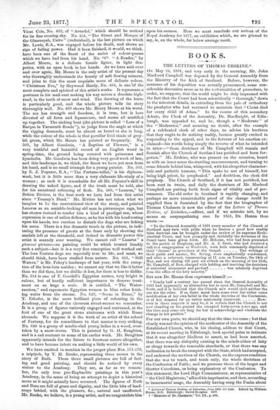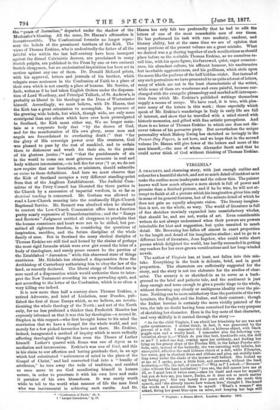BOOKS.
THE LETTERS OF THOMAS ERSKINE.* ON May 24, 1831, and very early in the morning, Mr. John MacLeod Campbell was deposed by the General Assembly from the Ministry of the Kirk of Scotland. Before, however, the sentence of his deposition was actually pronounced, some con- siderable discussion arose as to the technicalities of procedure, in order, we suppose, that the world might be duly impressed with the fact that the Court had been scientifically " thorough," down to the minutest details, in extruding from the pale of orthodoxy the presbyter who had ventured to maintain that " Christ died for every child of Adam." In the course of this secondary debate, the Clerk of the Assembly, Dr. MacKnight, of Edin- burgh, was appealed to, and he, though a " Moderate " of the " Moderates," and meaning no doubt, after the example of a celebrated clerk of other days, to advise his brethren that they ought to do nothing rashly, became greatly excited in responding to the appeal, and in the fervour of his emotion ea- claimed—his words being simply the reverse of what he intended to utter—" these doctrines of Mr. Campbell will remain and flourish after the Church of Scotland has perished and been for- gotten." Mr. Erskine, who was present on the occasion, heard as with an inner sense the startling announcement, and turning to. some friends behind him, whispered, with his altogether character- istic and pathetic humour, "This spake he not of himself, but being high priest, he prophesied." and doubtless, the clerk did prophesy. The Church of Scotland, if it has not perished, has been rent in twain, and daily the doctrines of Mr. Macleod Campbell are putting forth fresh signs of vitality and of per- manence. The old order in Scotland is rapidly changing, and perhaps no more unmistakable proof of the change could be supplied than is furnished by the fact that the biographer of Thomas Chalmers is now the editor of the Letters of Thomas• Erskine, of Linlathen,—editor, and if we mistake not, by no means an unsympathising one. In 1851, Dr. Hanna thus wrote :-
" To the General Assembly of 1831 every member of the Church of Scotland may turn with pride when he desires a proof how readily false doctrine can be brought under the review of its supreme Eccle- siastical Court, and how promptly and faithfully the decisions of the Court have been given forth. Mr. McLean, who had been presented to the parish of Dreghorn, and Mr. A. J. Scott, who had received a call to a congregation at Woolwich, were both summarily deprived of
their license' as preachers of the Gospel. The writings of their guide and master, Mr. Irving, were emphatically condemned, and after a sederunt, commencing at 11 a.m. on Tuesday, the 24th of May, and not closing till past six o'clock on the morning of the 25th, Mr. Campbell, of Row, charged with holding and teaching the doctrines of universal atonement and pardont was solemnly deprived from the office of the holy minstry."
But now Dr. Hanna thus expresses himself :— " Nearly half a century has passed since the General Assembly et 1831 had apparently no alternative but to eject Mr. Campbell and Mr. Scott, and it is belioved that the Church now would eject neither the one nor the other. If so, there must have come over her either some modification of her own belief in the whole doctrine of the Confession, or of her demand for an entire conformity therewith How- ever in these respects it may be, it is certain that the Church is not now standing on the ground she occupied forty-seven years ago, and the time may come ere long for her to acknowledge and vindicate the change in her position."
For our own parts, we should say that the time has come ; but that clearly was not the opinion of the moderator of the Assembly of the Established Church, who, in his closing, address to that Court, at its recent meeting in Edinburgh, took special pains to intimate that it was altogether libellous to assert, as had been asserted,. that there was any disloyalty existing in the minds either of laity or clergy towards the venerable standards, or that there was any inclination to break the compact with the State, which had accepted, and endowed the services of the Church, on the express condition that she was to teach, and teach only, the whole doctrines of the Confession of Faith; and we presume those of the larger and Shorter Catechism, as being explanatory of the Confession. To, this statement, the Lord High Commissioner, as representative of " the Civil Magistrate," affixed his imprimatur, and then, according to immemorial usage, the Assembly having sung the Psalm about
Hanna, D.D. Edinburgh: David Douglas. 1877.
* Letters of Thomas Erskine, of Linlathen, from 1800 tilt 1840. Edited by_vi'imani. t "Memoirs of Dr. ghalmers," Vol. III., p. 290. the " pesce of Jerusalem," departed under the shadow of the Moderator's blessing. All the same, Dr. Hanna's affirmation is incontrovertible. The Confessional formula; no longer repre- sent the beliefs of the prominent teachers of the Kirk. The views of Thomas Erskine, who is undoubtedly the father of all the faithful who within the last half-century have been insurgent against the dismal Calvinistic decrees, are proclaimed in many Scotch pulpits, are published in the Press by one or two eminent Scotch clergymen, but no ecclesiastical inquisition has been set in motion against any one of them. Dr. Donald McLeod prints, with his approval, letters and journals of his brother, which relegate some sentences in the Confession of Faith to a place of their own which is not exactly a place of honour. Mr. Service, of Inch, writes as if he had taken English Orders under the dispensa- tion of Lord Westbury, and Principal Tulloch, of St. Andrew's, is probably as liberal in his theology as the Dean of Westminster himself. Accordingly, we must believe, with Dr. Hanna, that the Kirk has a great orientation to accomplish. In presence of the growing wide beliefs, but which, though wide, are only more centripetal than any others which have ever been promulgated in. Scotland, the Kirk must either say, We no longer main- tain as a corporate body that "by the decree of God, and for the manifestation of His own glory, some men and angels are foreordained to everlasting death ;" that " for the glory of His sovereign power over His creatures, God was pleased to pass by the rest of mankind, and to ordain them to dishonour and wrath for their sin, to the praise of his glorious justice ;"* and "that the punishments of sin in the world to come are most grievous torments in soul and body without intermission,—in hell fire for ever ;"f or, we do not now require that our licentiates, or ministers, should subscribe -es animo to these definitions. And here we must observe that the Kirk of Scotland occupies a very different standing-point from that of the Anglican Establishment. The Judicial Com- mittee of the Privy Council has liberated the three parties in the Church by a succession of impartial verdicts, in so far as -doctrinal teaching is concerned. Mr. Gorham was allowed to read a Low-Church meaning into the confessedly High-Church Baptismal Service. Mr. Bennett was absolved when he claimed to convert the Low-Church Communion office into a function pretty nearly expressive of Transubstantiation ; and the " Essays and Reviews" Judgment entitled all clergymen to proclaim that the human conscience and heart were not to be stifled, but per- mitted all righteous freedom, in considering the questions of inspiration, sacrifice, and the future discipline of the whole family of man. But in Scotland the many clerical disciples of Thomas Erskine are still tied and bound by the chains of perhaps the most rigid formula; which were ever girt round the loins of a body of theologians, and surely peace cannot be the portion of the Established "Jerusalem " while this abnormal state of things continues. Mr. Ridsdale has obtained a dispensation from the Archbishop of Canterbury authorising him to obey the law of the land, as recently declared. The liberal clergy of Scotland are in sore need of a dispensation which would authorise them to inter- pret the New Testament according its own pervading spirit, and not according to the letter of the Confession, which is so often a very killing one indeed.
It is now more than half a century since Thomas Erskine, a retired Advocate, and laird of Linlathen, near Dundee, pub- lished the first of those Essays which, as we believe, are revolu- tionising the whole theology of the North ; and not of the North only, for no less profound a thinker than Frederick Maurice has -expressly informed us that it was this lay theologian—a second St. Stephen in this respect—who first brought home to his mind the conviction that we have a Gospel for the whole world, and not merely for a few picked favourites here and there. Mr. Erskine, indeed, inaugurated a method of inquiry which is more radically -affecting theological thought than even the Theses of Luther himself. Luther's quarrel with Rome was one of degree as to mediation and intercession. Erskine's was one of kind, and this is his claim to our affection and lasting gratitude that, in an age which had substituted " seriousness of mind in the place of the Gospel of Christ," and had converted God into a " bundle of attributes," he tore away the veils of tradition, and enabled us once more to see God manifesting himself in human nature, in order to penetrate it with his own love and make it partaker of his own blessedness. It was surely worth while to tell to the world what manner of life the man lived who was instrumental in achieving such results. And Dr.
• Confession of Faith," ch. 3. t " Larger Catechism," Q. 29.
Hanna has only felt too profoundly that he had to edit the letters of one of the most remarkable men of our times. He has performed his task with rare modesty, candour, and literary ability, but at the same time we are of opinion that many portions of the present volume are a great mistake. What we desired was a gr thering together of such recollections as should place before us the veritable Thomas Erskine, as we ourselves re- call him, with his spare figure, his furrowed, quiet, eager counten- ance, his abundant culture, his affluent humour, his unobtrusive but inevitable aggressiveness, and his godliness, which stole upon the sense like the perfume of the half hidden-violet. But instead of any such portraiture we have presented to us quite a forest of letters, many of which are not in the least characteristic of the writer, while some of them are wearisome and even painful, because sur- charged with the evangelic phraseology and morbid self-introspec- tion from which Mr. Erskine's published writings themselves supply a means of escape. We have read, it is true, with plea- sure many of the letters in this work ; those especially which speak of Mr. Erskine's wanderings in Italy in early life are full of interest, and show that he travelled with a mind stored with historic memories, and gifted with fine artistic perceptions. And there is no letter of Thomas Erskine in which one does not dis- cover tokens of his pervasive piety. But nevertheless the unique personality which Bishop Ewing has sketched so lovingly in the Present-Day Papers, is not here, and we hope that in the second volume Dr. Hanna will give fewer of the letters and more of the man himself,—the man of whom Alexander Scott said that he could never think of God without thinking of Thomas Erskine.



































 Previous page
Previous page